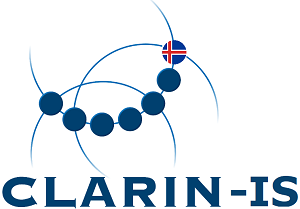

Iceland has been involved with CLARIN for a number of years, first becoming a member of the consortium of the CLARIN Preparatory Phase project in 2010, but without any funding. Since CLARIN ERIC was founded, Icelandic researchers have had numerous meetings with officials from the Ministry of Education, Science and Culture to advocate CLARIN membership. Despite not being a member of CLARIN, Iceland participated in the Nordic CLARIN Network, which was active from 2014–2017, and Icelandic researchers took part in a number of meetings and workshops organized by the network. In June 2017, the Nordic CLARIN Network arranged a workshop at the University of Iceland to discuss the possibility of Iceland joining CLARIN. The workshop was attended by representatives from five Icelandic institutions which possess language resources or make use of them in their work, and representatives from the Ministry of Education, Science and Culture, and the Icelandic Centre for Research. Bente Maegaard, Vice Executive director of CLARIN, and the National Coordinators for Sweden and Finland presented CLARIN for the workshop participants.
In October 2016, the Minister of Education, Science and Culture appointed a special language technology steering group which commissioned three language technology experts to work out a detailed project plan for Icelandic language technology. The project plan was handed to the Minister in June 2017, and by November of that year, the new government decided to implement the plan and fund it for the next five years. The project plan had a special chapter on CLARIN where the importance of Iceland joining CLARIN ERIC was emphasized. The benefits of membership for Iceland were explained in detail, by gaining access to numerous tools and resources, and to expertise in several matters. A great number of resources and tools would be developed within the Language Technology Program, and it was of utmost importance that they would be described and stored according to established standards. The project plan pointed out that CLARIN could provide invaluable assistance in these matters.
Following the proposal made in the project plan, the Ministry of Education, Science and Culture decided to fund CLARIN ERIC membership. As it turned out, however, Icelandic law need to be changed if Iceland were to become a full member of CLARIN ERIC. Applying for observership was decided, in lieu of waiting for these changes in the law to be made. Iceland's application for observership was approved by the CLARIN ERIC General Assembly on November 22, 2018. In June 2019, the Icelandic Parliament (Alþingi) passed new law on European Research Infrastructure Consortia (ERICs) which made it possible for Iceland to become full member of ERICs. The Minister of Education, Science and Culture decided in early 2020 that Iceland would apply for full membership in CLARIN ERIC. The application was approved in late February and Iceland became a full member of CLARIN ERIC from February 1, 2020. The membership agreement was signed on March 10, 2020.
The Ministry has assigned The Árni Magnússon Institute for Icelandic Studies the role of representing Iceland in CLARIN ERIC and leading an Icelandic CLARIN consortium. Ásgerður Kjartansdóttir, Senior Adviser in the Office of the Permanent Secretary in the Ministry represent Iceland in the General Assembly for the first few years, and Professor Emeritus Eiríkur Rögnvaldsson was appointed as National Coordinator for Iceland.
In 2021, Starkadur Barkarson took over as national coordinator of CLARIN in Iceland, and in 2023 the centre was approved as a CLARIN Technical Centre (CLARIN B-centre). Two years later, the Centre was renamed "The Icelandic Language Bank" and a new website was opened.